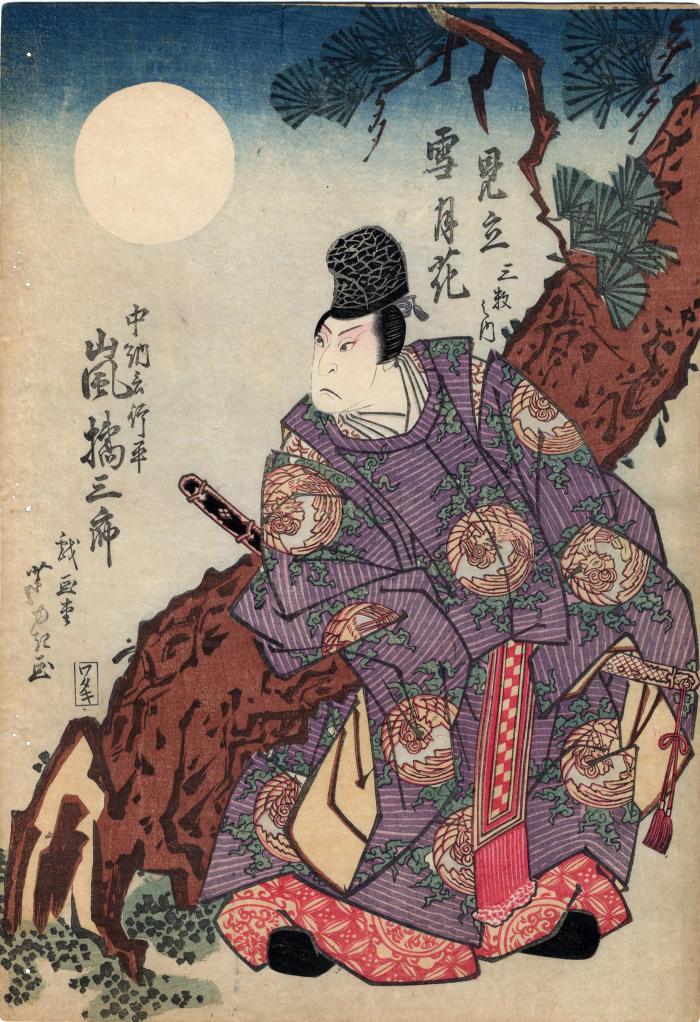Gigadō Ashiyuki (戯画堂芦ゆき) (artist )
Arashi Kitsusaburō II (嵐橘三郎) in the role of Chūnagon Yukihira (中納言行平) in The Snow, The Moon, and The Flowers (Mitate Setsugekka - 目立雪月花)
1823
10.25 in x 14.75 in (Overall dimensions) Signed: Gigadō Ashiyuki ga
戯画堂芦ゆき画
Publisher: Wataya Kihei
(Marks 579- seal 25-056)
Hankyu Culture Foundation
Victoria and Albert Museum Chūnagon (中納言) is a title and not a proper name. It means 'Middle Counselor'. The figure represents Ariwara no Yukihira (在原行平: 818-893).
"Early Heian waka poet, courtier. As a poet he stands in the shadow of his younger brother, Ariwara Narihira. But he was considerably involved in court affairs, becoming a middle counseller [sic] (chūnagon) and head of the bureau of civil affairs after holding other appointments. Although not as famous as Sugawara Michizane, he shared Michizane's fate as a prey to Fujiwara hegemony and as an exiled poet. Numerous works deal with, parallel, or allude to his exile in Suma. Among them are the 'Suma' chapter of Murasaki Shikibu's Genji Monogalari; the nō, Matsukaze, is another conspicuous example. Renga, jōruri, and haikai also recall him and his poems. In those poems and in his legend, he lives on as one of the unfortunate heroes periodically remembered when another person suffers similar exile or suffering."
Quoted from: The Princeton Companion to Classical Japanese Literature by Miner, Odagiri and Morrell, 1985, p. 143.
****
As noted above Ariwara no Yukihira plays a significant role in the nō play Matsukaze. Below is a description of that play from Theatricalities of Power: The Cultural Politics of Noh by Steven T. Brown, pp. 29-30. The connection between Yukihira and the pine tree is made more apparent by that text.
"Matsukaze tells the story of two ghostly sisters, Matsukaze and Murasame, who pined away after their aristocratic lover, Ariwara no Yukihira (818-93), abandoned them in Suma Bay, southwest of Kyoto. The two sisters have haunted the area ever since, awaiting the return of their lover, who is himself no longer alive. In the climactic scene of the play, Murasame watches in amazement as Matsukaze slips into a state of derangement, donning Yukihira's keepsake cap and robe and dancing as if possessed by the spirit of Yukihira, while the chorus serves as her mouthpiece:
Kore wo miru tabi niThe challenge facing the actor of this role is that he must become the otherness of both Matsukaze and her lover Yukihira: in effect, the audience is presented with a scene of double cross-dressing, in which a male actor plays a woman playing a man. Complicating matters even further, at the same time that she assumes the demeanor of Yukihira, Matsukaze also mistakes a pine tree on stage — which earlier served as the two sisters' grave marker — for Yukihira, thus simultaneously embodying Yukihira's otherness and also seeing that otherness projected onto the pine tree. In the phantasmal interchange between Matsukaze and Yukihira, the pine tree oscillates between presence and absence, self and other: the presencing of absence and the othering of the self. As soon as the possessed Matsukaze tries to reach out to Yukihira as Yukihira by embracing the pine tree signifying 'Yukihira,' the pine tree reemerges as a pine tree, dispelling the phantasmic signification of Yukihira and dashing Matsukaze's hopes of reunion."
lya mashi no omoigusa
Hazue ni musubu tsuyu no ma mo
Wasurareba koso ajikinaya....
Wasuregatami mo yoshinashi to
Sutete mo okarezu
Toreba omokage ni tachimasari.
Every time I look at them,
my tangled thoughts grow in ever greater profusion;
for even as briefly as the dew clings to the leaf tips,
if only I could forget — how miserable I am!...
His keepsakes, difficult to forget, do me no good!
Though I discard them, I cannot let them lie;
picking them up again, his visage haunts me once more.
****
Another clue to this print may lie in one of the poems by Yukihari included in the Kokinshu. It includes the word 'pine' (matsu) and a sense of waiting for or anticipation.
立ち別れJoshua S. Mostow wrote: "Inaba no yama is a specific mountain in Inaba province, north of Kyoto on the Sea of Japan, where Yukihira went to serve as governor in 855.... The name also serves as a pivot word, since inaba can mean '(even) if I leave.' The entire first three lines serve as a preface (jo) for the word matsu. This word too is a pivot word, meaning both 'to wait' and 'pine tree,' much like the English word 'pine.' "
いなばの山の
まつとし聞かば
今かへりこむ
tachi-wakare
inaba no yama no
mine ni ofuru
matsu to shi kikaba
ima kaheri-komu
Even if I depart
and go to Inaba Mountain
on whose peak grow
pines, if I hear you pine for me,
I will return straight away to you.
Yukihira was governor of Inaba before he was exiled to Suma Bay.
****
The earliest known poetry match was held at the home of Ariwara no Yukihira between 885 and 887.
****
There are three prints in the Lyon Collection which deal with Yukihira's younger and more famous brother, Narihira. See numbers 490 and 574 by Shigeharu and 882 by Utamaro,
****
Illustrated in color in Ikeda Bunkō, Kamigata yakusha-e shūsei (Collected Kamigata Actor Prints) vol. 1, Ikeda Bunko Library, Osaka 1997, no. 212, page 74.
Wataya Kihei (綿屋喜兵衛) (publisher)
Kyōto-Osaka prints (kamigata-e - 上方絵) (genre)
actor prints (yakusha-e - 役者絵) (genre)
mitate-e (見立て絵) (genre)
Arashi Kitsusaburō II 二代目嵐橘三郎 (9/1822 to 8/1828) (actor)
Ariwara Narihira (在原業平: from 825 to 880) (author)
